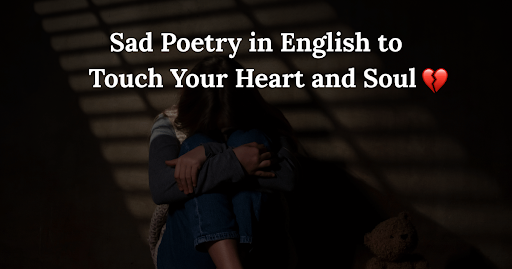Sadness is a feeling we all share, yet finding the right way to express it can be so difficult. For the heartbroken, when words fail to capture the depth of pain, sad poetry steps in, offering a voice to sorrow. It becomes a safe space to explore loss, heartache, and those heavy moments that feel impossible to bear. Poetry doesn’t just reflect sadness, it transforms it into something meaningful.
For centuries, poets have used the written word to explore the depths of grief and love. Their expressions connect us to shared human experiences, becoming an enduring source of comfort and understanding. With subjects ranging from Love Poetry Urdu to English-language masterpieces, the themes may be different, but the emotions remain the same.
Why Sad Poetry Resonates
Sad poetry holds a unique place in our hearts because it validates emotions that are often hidden or unspoken. These verses remind us that we are not alone in our struggles:
- It evokes deep emotions: The honesty and vulnerability in sad poetry connect us to the poet’s heart, prompting us to reflect on our own.
- It fosters healing: Writing or reading poetry acts as an emotional release, helping us process grief, heartache, or loss.
- It bridges connections: These verses speak directly to our experiences, assuring us that others understand and share similar pain. Often, they mirror the struggles we face with family members, love, and internal battles.
For those navigating difficult times, sad poetry becomes a necessary companion. It’s a way to reshape sorrow into beauty and turn personal pain into something universal.
Famous Poets and Their Heartfelt Creations
English literature boasts a long list of poets who explored the nuances of sadness, creating unforgettable works that continue to resonate through time. Key examples include:
- Sylvia Plath: Known for capturing the raw, untamed corners of despair and depression, Plath’s work endures as a gritty and honest portrayal of loss.
- John Keats: Through deeply personal reflections, Keats cemented his legacy with melancholic poetry that evokes the fragility of existence.
- Edgar Allan Poe: Renowned for his dark and gothic style, Poe created haunting pieces like The Raven that explore themes of loss, madness, and sorrow.
- Emily Dickinson: Her poignant take on mortality and longing gave voice to quiet, introspective grief.
- Christina Rossetti: She infused delicate beauty into sorrow, particularly evident in her poem Remember, a reflection on love and death.
Common Themes in Sad Poetry
While the tones and styles of poetry vary, there are recurring themes that appear frequently in sad verses, including:
- Lost love: The bittersweet ache of a love that cannot be salvaged or sustained.
- Death and mourning: Processing the overwhelming emotions of losing someone dear.
- Existential sorrow: Questions about life, purpose, and the human condition.
- Unfulfilled dreams: The sadness of unrealized aspirations or lost potential.
These deep emotional currents give sad poetry a timeless quality. Each poem reveals a sense of wonder, even within despair, how human beings can articulate pain so beautifully.
Top Sad Poems in English by Famous Poets
1. “When You Are Old” – W. B. Yeats
In this poignant poem, the poet reflects on aging, love, and memory. He speaks to a future version of a beloved, asking her to look back on her life when she is old and remember the depth of their connection.
When you are old and grey and full of sleep,
And nodding by the fire, take down this book,
And slowly read, and dream of the soft look
Your eyes had once, and of their shadows deep;
How many loved your moments of glad grace,
And loved your beauty with love false or true,
But one man loved the pilgrim soul in you,
And loved the sorrows of your changing face;
And bending down beside the glowing bars,
Murmur, a little sadly, how Love fled
And paced upon the mountains overhead
And hid his face amid a crowd of stars.
2. “Remember” – Christina Rossetti
The poet pours out a heartfelt longing, asking to be remembered even after they have gone. They reflect on the inevitable separation that death will bring, urging the listener to hold onto their memory despite the silence that will follow.
Remember me when I am gone away,
Gone far away into the silent land;
When you can no more hold me by the hand,
Nor I half turn to go yet turning stay.
Remember me when no more day by day
You tell me of our future that you plann’d:
Only remember me; you understand
It will be late to counsel then or pray.
Yet if you should forget me for a while
And afterwards remember, do not grieve:
For if the darkness and corruption leave
A vestige of the thoughts that once I had,
Better by far you should forget and smile
Than that you should remember and be sad.
3. “A Slumber Did My Spirit Seal” – William Wordsworth
William Wordsworth reflects on the unchanging and eternal nature of a loved one who has passed away, free from the impact of time and earthly life.
A slumber did my spirit seal;
I had no human fears:
She seemed a thing that could not feel
The touch of earthly years.
No motion has she now, no force;
She neither hears nor sees;
Rolled round in earth’s diurnal course,
With rocks, and stones, and trees.
4. “Tears, Idle Tears” – Alfred, Lord Tennyson
In an emotional reflection, these lines express the deep sorrow and longing for days gone by, the bittersweet memories of moments that can never return. The tears arise from an inexplicable despair, stirred by the beauty of autumn fields and the aching thoughts of a time forever lost.
Tears, idle tears, I know not what they mean,
Tears from the depth of some divine despair
Rise in the heart, and gather to the eyes,
In looking on the happy autumn-fields,
And thinking of the days that are no more.
Fresh as the first beam glittering on a sail,
That brings our friends up from the underworld,
Sad as the last which reddens over one
That sinks with all we love below the verge;
So sad, so fresh, the days that are no more.
Dear as remembered kisses after death,
And sweet as those by hopeless fancy feigned
On lips that are for others; deep as love,
Deep as first love, and wild with all regret;
O Death in Life, the days that are no more!
5. “How Could I Be So Lonely” – Sanah Kazmi
How could I be so lost
In a place I know so well?
How could I be so broken
In a family so together?
How could I be so lonely
Surrounded by so many?
How could I be so unhappy
Surrounded by so much beauty?
How could I be me
When even I remain a mystery?
6. “A Broken Appointment” – Thomas Hardy
You did not come,
And marching Time drew on, and wore me numb,—
Yet less for loss of your dear presence there
Than that I thus found lacking in your make
That high compassion which can overbear
Reluctance for pure lovingkindness’ sake
Grieved I, when, as the hope-hour stroked its sum,
You did not come.
You love not me,
And love alone can lend you loyalty;
–I know and knew it. But, unto the store
Of human deeds divine in all but name,
Was it not worth a little hour or more
To add yet this: Once you, a woman, came
To soothe a time-torn man; even though it be
You love not me?
7. “Come Not, When I Am Dead” – Alfred, Lord Tennyson
The poet is expressing a desire for peace and rest after death, urging others not to mourn or show regret at their grave. They reject displays of sorrow or guilt, emphasizing that their time of suffering is over. Instead, they encourage the living to move on with their lives.
Come not, when I am dead,
To drop thy foolish tears upon my grave,
To trample round my fallen head,
And vex the unhappy dust thou wouldst not save.
There let the wind sweep and the plover cry;
But thou, go by.
Child, if it were thine error or thy crime
I care no longer, being all unblest:
Wed whom thou wilt, but I am sick of Time,
And I desire to rest.
Pass on, weak heart, and leave to where I lie:
Go by, go by.
8. Autumn Song Poem – Sarojini Naidu
Sarojini Naidu captures the fleeting beauty of nature and the deep emotions of the heart in this poem, comparing the golden hues of a sunset and fluttering leaves to the transient dreams and sorrows of life.
Like a joy on the heart of a sorrow,
The sunset hangs on a cloud;
A golden storm of glittering sheaves,
Of fair and frail and fluttering leaves,
The wild wind blows in a cloud.
Hark to a voice that is calling
To my heart in the voice of the wind:
My heart is weary and sad and alone,
For its dreams like the fluttering leaves have gone,
And why should I stay behind?
Finding Solace in Sad Poetry
Sad poetry isn’t just about loss or heartbreak, it’s about connection. It reaches out to comfort you when you feel overwhelmed by your emotions. Sometimes, they remind you that you are still alive, still capable of feeling, still capable of hope.
Sad poems can guide a grieving person toward meaning, even in the midst of sorrow, and let a flicker of light through the cracks. For poetry lovers, there is always a line, story, a stanza, or an entire poem waiting to connect you to moments you thought were unspeakable.

